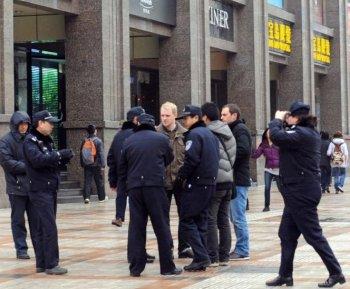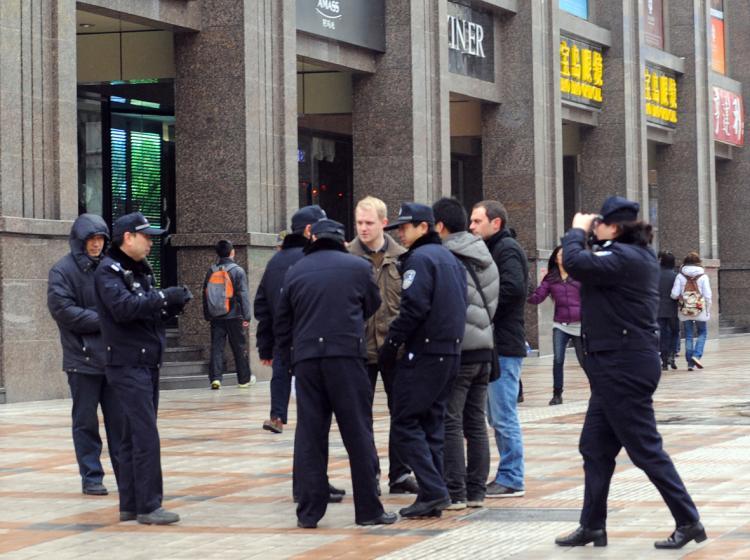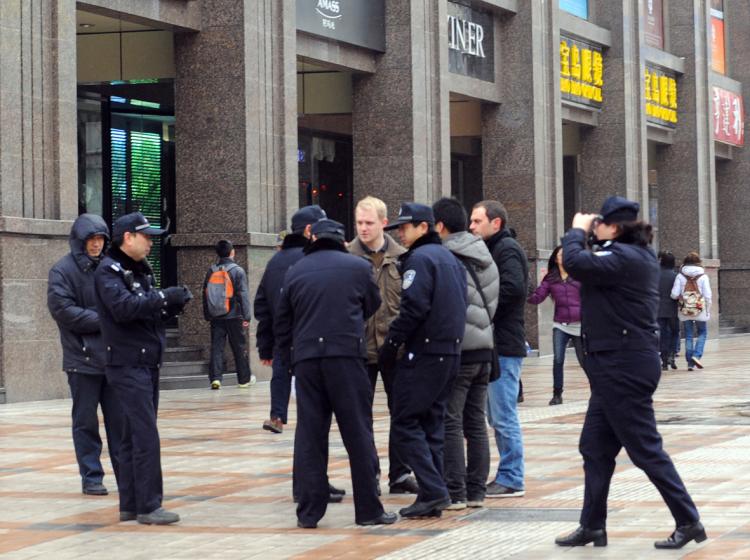Rather than reporting news, foreign reporters in China have recently become the news. After being physically assaulted and harassed by Chinese police for standing in the streets, they were later subjected to an hour and a half of scolding by a Ministry of Foreign Affairs (MFA) spokesperson at a news conference.
The actions taken against foreign reporters have made it clear that this is a “highly sensitive” time for the CCP. The formerly “relaxed” rules for foreign journalists in China seem to no longer apply, and neither does the regime veil its disdain of the world’s free press.
The shrill, irrational, authoritarian comments by MFA spokesperson Jiang Yu reflect the Chinese regime’s fears and impotence of dealing with the threat of mass discontent in China in a civilized and humanitarian manner.
On Feb. 27, a large number of foreign journalists gathered along Wangfujing Street, a busy business section in Beijing, trying to report on Jasmine protest that had been announced on the Internet. The journalists were violently assaulted and dispersed by police, some were arrested.
On March 1, Jiang Yu, spokesperson of the MFA held a press conference and got tangled up in a heated verbal exchange with dozens of foreign journalists. The astonishing spectacle was reported by world media, including Japan’s official television station NHK, Radio France Internationale (RFI), and Taiwan’s United Daily News.
The MFA press conference broke many records, including taking the longest time, and the number of times a single question was asked.
Foreign journalists were treated to a sample of the Chinese Communist Party’s favorite defense strategies: deny the facts and blame the victims.
After more than 30 reporters asked the same question, why plain clothes police can attack foreign journalists and even take some of them into custody, Jiang rebuked them to stop mentioning the Wangfujing incident again.
Jiang turned tables and said the journalists are to blame for the trouble at Wangfujing.
“Why do some journalists always create trouble?” she asked. “We find it strange. Who did so many reporters receive a notice from? Who called on you to gather and stake out there? This is the question I would like to ask you,” Jiang said.
She also insisted that the policy is “very clear,” and that it was the reporters who had deliberately misinterpreted it.
“A huge group of people gathered and staked out in a busy business street for a long time for no reason at all, and the policemen on duty tried to guide and disperse the journalists. The journalists should understand and cooperate,” Jiang said.
“This is the fact, and you should not distort the facts. As a reporter, fairness is your basic professional ethics,” Jiang added with a stern demeanor.
Next: Regulations for Foreign Journalists
During the Beijing Olympics, the Chinese regime’s State Council had issued Decree No. 537 called “Regulations Concerning Foreign Journalists and Permanent Offices of Foreign Media Organizations.” The decree said that China has relaxed interview restrictions on foreign journalists, allowing them to interview in areas other than Tibet, without the need to apply for a permit from the local foreign affairs office. However they need to obtain consent from the organizations and individuals to be interviewed.
At another regular MFA press conference on March 3, a reporter asked Jiang whether Decree 537 had expired. Jiang never answered the question, but accused journalists of not abiding by Chinese law. She repeated what she said on March 1, namely that reporters should understand and cooperate with the police.
When a reporter asked if she could tell them clearly which law the reporters had violated, Jiang first replied that the reporters have broken the rule that applications are required prior to reporting at that location.
But then she made this ominous remark: “Don’t use the law as a shield. The thing is, some people do not hesitate to stir up troubles and attempt to create trouble in China. For those with that kind of motive, I think no law can protect them.”
Similar incongruent, but revealing, remarks slipped from the tongue of Yang Jiechi, Minister of Foreign Affairs, at a March 7 press conference, when reporters asked him about Chinese police using violence against foreign journalists.
Yang replied that there was no such issue as Chinese police physically assaulting foreign journalists.
He then quickly changed the subject and said, “I did not see any sign of tension. ... Therefore we don’t want to see anyone make something out of thin air.”
China used to be afraid of international public opinion and its foreign influence, but that seems to have changed now, Li Xiaobing, director of Western Pacific Institute at the University of Central Oklahoma, told Radio Free Asia (RFA) in a March 6 article.
“It is like he who has wealth speaks louder than others, they do not care about voices from media or human rights organizations. This is different from ten years or even five years ago,” Li said.
Li said Jiang is not just representing her own personal opinion. The attitude of the entire regime, from top to bottom, is somewhat stauncher now, which is different from the past when China used to keep a low profile, Li said. “This is a noteworthy phenomenon,” he added.
Since 2008, from just before the Beijing Olympics to recently, the restrictions on media interviews have been relatively relaxed, Professor Yang Dali from the University of Chicago told RFA. “But judging from the recent situations in China, it is no longer the case,” he said.
Contact: [email protected]
The actions taken against foreign reporters have made it clear that this is a “highly sensitive” time for the CCP. The formerly “relaxed” rules for foreign journalists in China seem to no longer apply, and neither does the regime veil its disdain of the world’s free press.
The shrill, irrational, authoritarian comments by MFA spokesperson Jiang Yu reflect the Chinese regime’s fears and impotence of dealing with the threat of mass discontent in China in a civilized and humanitarian manner.
Policy ‘Very Clear’
On Feb. 27, a large number of foreign journalists gathered along Wangfujing Street, a busy business section in Beijing, trying to report on Jasmine protest that had been announced on the Internet. The journalists were violently assaulted and dispersed by police, some were arrested.
On March 1, Jiang Yu, spokesperson of the MFA held a press conference and got tangled up in a heated verbal exchange with dozens of foreign journalists. The astonishing spectacle was reported by world media, including Japan’s official television station NHK, Radio France Internationale (RFI), and Taiwan’s United Daily News.
The MFA press conference broke many records, including taking the longest time, and the number of times a single question was asked.
Foreign journalists were treated to a sample of the Chinese Communist Party’s favorite defense strategies: deny the facts and blame the victims.
After more than 30 reporters asked the same question, why plain clothes police can attack foreign journalists and even take some of them into custody, Jiang rebuked them to stop mentioning the Wangfujing incident again.
Jiang turned tables and said the journalists are to blame for the trouble at Wangfujing.
“Why do some journalists always create trouble?” she asked. “We find it strange. Who did so many reporters receive a notice from? Who called on you to gather and stake out there? This is the question I would like to ask you,” Jiang said.
She also insisted that the policy is “very clear,” and that it was the reporters who had deliberately misinterpreted it.
“A huge group of people gathered and staked out in a busy business street for a long time for no reason at all, and the policemen on duty tried to guide and disperse the journalists. The journalists should understand and cooperate,” Jiang said.
“This is the fact, and you should not distort the facts. As a reporter, fairness is your basic professional ethics,” Jiang added with a stern demeanor.
Next: Regulations for Foreign Journalists
Regulations for Foreign Journalists
During the Beijing Olympics, the Chinese regime’s State Council had issued Decree No. 537 called “Regulations Concerning Foreign Journalists and Permanent Offices of Foreign Media Organizations.” The decree said that China has relaxed interview restrictions on foreign journalists, allowing them to interview in areas other than Tibet, without the need to apply for a permit from the local foreign affairs office. However they need to obtain consent from the organizations and individuals to be interviewed.
At another regular MFA press conference on March 3, a reporter asked Jiang whether Decree 537 had expired. Jiang never answered the question, but accused journalists of not abiding by Chinese law. She repeated what she said on March 1, namely that reporters should understand and cooperate with the police.
When a reporter asked if she could tell them clearly which law the reporters had violated, Jiang first replied that the reporters have broken the rule that applications are required prior to reporting at that location.
But then she made this ominous remark: “Don’t use the law as a shield. The thing is, some people do not hesitate to stir up troubles and attempt to create trouble in China. For those with that kind of motive, I think no law can protect them.”
Similar incongruent, but revealing, remarks slipped from the tongue of Yang Jiechi, Minister of Foreign Affairs, at a March 7 press conference, when reporters asked him about Chinese police using violence against foreign journalists.
Yang replied that there was no such issue as Chinese police physically assaulting foreign journalists.
He then quickly changed the subject and said, “I did not see any sign of tension. ... Therefore we don’t want to see anyone make something out of thin air.”
Regime More Outspoken
China used to be afraid of international public opinion and its foreign influence, but that seems to have changed now, Li Xiaobing, director of Western Pacific Institute at the University of Central Oklahoma, told Radio Free Asia (RFA) in a March 6 article.
“It is like he who has wealth speaks louder than others, they do not care about voices from media or human rights organizations. This is different from ten years or even five years ago,” Li said.
Li said Jiang is not just representing her own personal opinion. The attitude of the entire regime, from top to bottom, is somewhat stauncher now, which is different from the past when China used to keep a low profile, Li said. “This is a noteworthy phenomenon,” he added.
Since 2008, from just before the Beijing Olympics to recently, the restrictions on media interviews have been relatively relaxed, Professor Yang Dali from the University of Chicago told RFA. “But judging from the recent situations in China, it is no longer the case,” he said.
Contact: [email protected]





